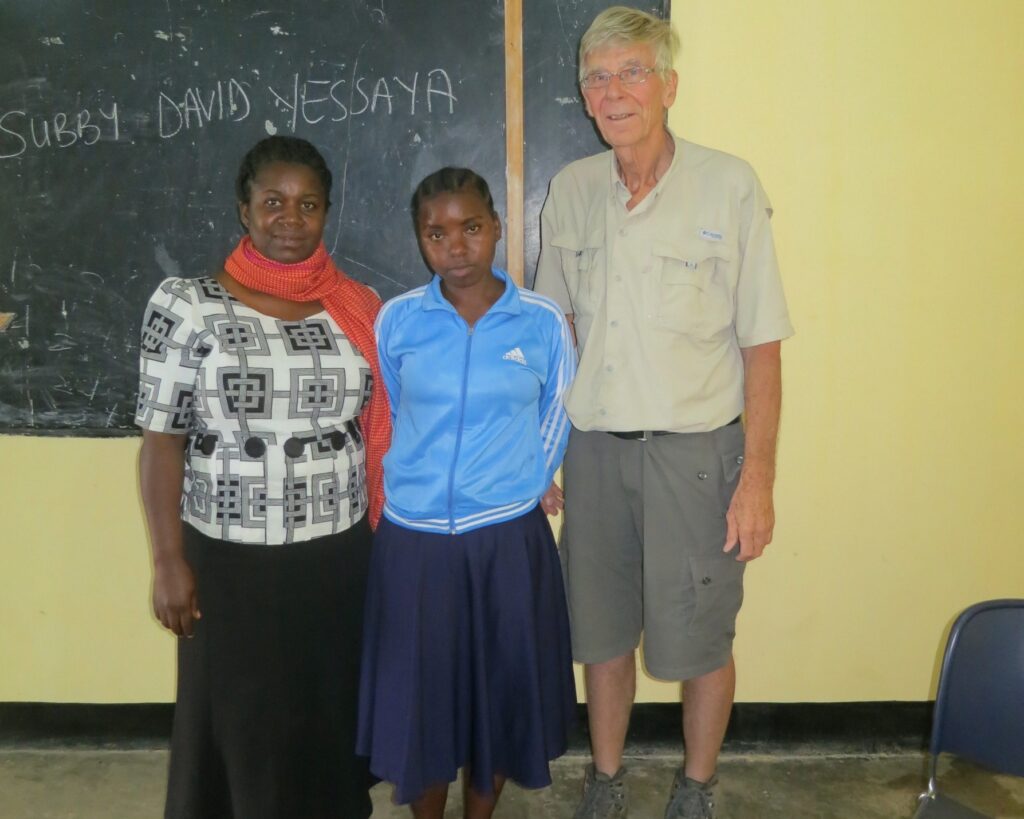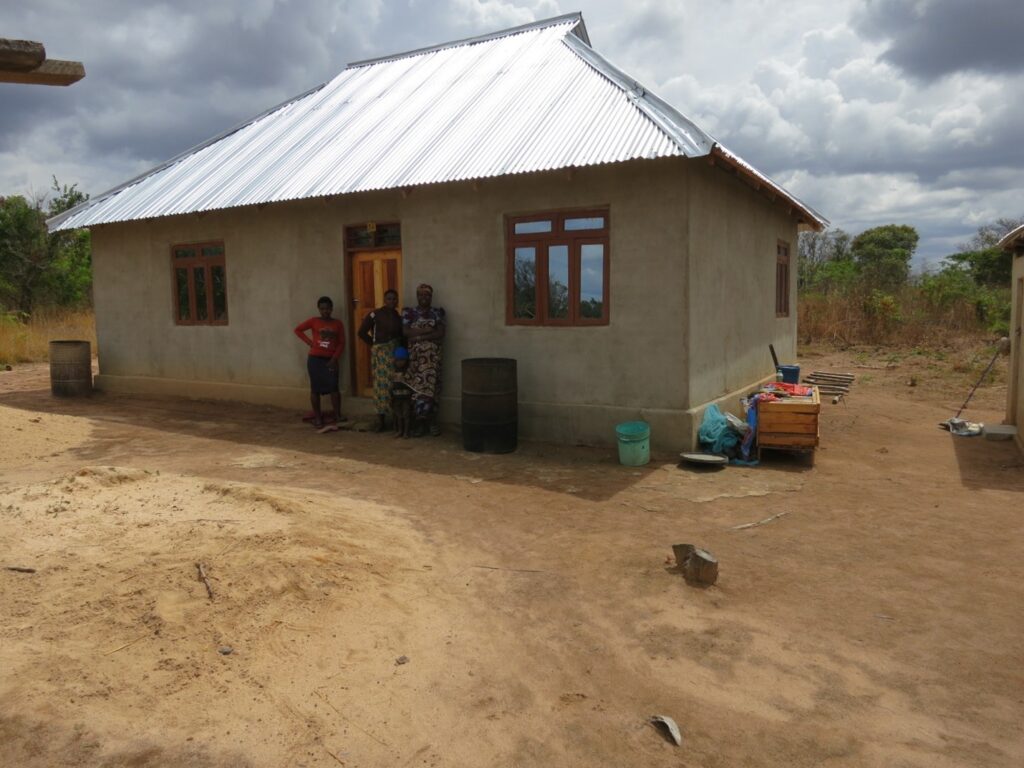Determination for education
This newsletter will be somewhat different from my others. I want to focus on the story of Rose Mwagala, my travel companion this year.
Rose graduated from the school of nursing in Mbeya this year, and will take the examination for her nursing license on December 15. At her current age of 28, she is probably the oldest student we have sponsored.

I have learned quite a bit about Rose over the past three years – especially during our recent travels! Rose comes from a very rural environment. Her mother is the sixth wife of her now deceased father. Rose is her mother’s eldest child. She has two sisters and a brother.
There is no electricity where she comes from, and her mother is a peasant farmer on a small plot of land that only provides subsistence support. Rose completed primary school and the first four years of secondary school (ordinary level) locally. During this time, she also worked extensively as a farm laborer to contribute to her mother’s household expenses.
In Tanzania, on completion of four years of O-level, students take a national examination. The results determine if the student is allowed to continue to the next two years of secondary education (advanced or A-level education). Rose did not do well on the national exam and was not allowed to continue her education. But, she made a decision to retake her O-level studies. When I asked her why, she told me that she had seen the poverty in her household and decided that the only way out was education. This decision set her on her path.
Students who do not do well in the O-level national examination are not allowed to repeat their O-level studies in a public school. Instead, she had to find a private school, where fees are much higher. Her family did not have the money to pay the required costs, thus she needed to find a way to come up with the money.
Rose found a family in Njombe that offered to pay her school fees. In exchange, she worked as their house girl (i.e., maid). Unfortunately, this arrangement fell apart during her first year back at school. The family never paid her fees and she had to stop her studies. After dropping out of school, she decided to earn money picking tea in the Njombe area.
Picking tea leaves involves walking with a basket on your back, selecting appropriate leaves and dropping them into the basket. It is not easy work and snakebites are an occupational hazard. Rose did this work for approximately eighteen months and saved about $900. This allowed her to return to the private school. She told me that she was picking tea from dawn to dark and in the rain. Collecting tea leaves in the rain had an advantage – the wet leaves weighed more and her earnings were based on weight.
When she restarted her O-level studies, she did not need to spend all the money at once. In order to generate income for herself, she started a microfinance scheme where she lent money that she currently did not need. Here, I should mention that she is extremely personable. She can easily strike up a conversation with whoever is around and establishes good rapport. When asked if she ever lost money making loans, she told me that she never had any bad debt. I suspect that this has a lot to do with the relationships she develops.
By the time she completed retaking the O-levels, the money had run out and she went to Dar es Salaam to work as a house girl for a ten-month period, where she earned approximately TSH 200,000 (less than $100).
During her stay in Dar es Salaam, she learned that her O-level results allowed her to continue to the two-year A-level program. She was selected to join A-level studies at the Songea Girls Secondary School, a government boarding school. The TSH 200,000 that she had earned paid for the first year of her A-level studies, and she was allowed to continue without any additional payment due to her economic status and good academic performance.
Following completion of her A-level studies, she applied and was accepted to the nursing program in Mbeya, a school where we sponsor students. At that time, she returned to Njombe, where she collected the remaining outstanding loans, with the accumulated interest. She told me that she collected approximately TSH 300,000 (approximately $140). However, at the time of registration for the nursing program, she was told she could not register because she did not have enough money to pay the fees for the first semester.
So, Rose talked the pastor at the Pentecostal church she had attended in Mbeya. He held a collection at the church that netted an additional TSH 240,000, enabling her to register for the first semester.
However, after registering for the nursing program, she had no money for various needs, including food. One of her fellow students, who had also graduated from Songea Girls Secondary School, started a collection for Rose that raised TSH 30,000. This money allowed her to eat for a while. This brings us to the time I arrived at the school in November 2019.
When I visited the school, the principal told me about Rose and her circumstances. I indicated that we would sponsor her, starting with her first year of studies. At the time, she was wearing her secondary school outfit because she did not have money to purchase the appropriate uniform. She also needed shoes and many other items. We made an extensive list of her needs and the estimated cost. The objective was to allow her to focus on her studies without worry. She did very well during her three years in the diploma program finishing with a 4.3 GPA out of 5.0.

But wait! There’s more!
I recently I learned that Rose had been very concerned about her mama’s living condition during this time. Her mother lived in a house constructed of woven branches and mud, with grass roofing. The house was very dilapidated. Part of the roof had collapsed and there were leaks So, Rose used part of the money we had provided to rent a piece of land, buy seed and raise maize and beans during her first and second year of studies. She worked on the rented land every weekend, eventually harvesting and selling the crops. Over the course of two years, she netted TSH 4.5 million (approximately $2050). During the third year of her studies, she spent this money to build a five-room house and an outside toilet for her mother.
During our travel we visited her mother and I saw the house. (I should also mention that I learned firsthand her frugality. She was constantly reminding me that we could eat cheaper, pay less for hotels, etc.)
Here is a photo of the house she had built for her mama. In another letter I will tell you about the visit with Rose’s mama.

I have been very impressed with Rose’s determination to obtain an education and a profession, while simultaneously improving her mother’s living conditions. Next, she will continue her studies, pursuing a BS in nursing . We anticipate that she will be accepted for entry at Muhimbili University for the next academic year.
Rose’s story has truly been one of determination and focus.
If you have any questions or comments, please do not hesitate to leave them below.
7jxueo
jm8rtj
An amazing story of courage and determination. this young lady will go far
Congratulation strong woman Rose, you are taking the right path to success. All the best in your studies. Since I met with her I am impressed with her character, I have seen me in her in many ways. You are the best organization TNSPinc! Thank you for the best work on The Earth.
Thanks for this inspiring story of Rose’s persistence and ingenuity in the face of adversity. This young lady will go far, and help so many others on the way!
Thank you for this inspiring story of persistence and ingenuity in the face of adversity, This young lady will go far, and help so many others!
Thankx to God and all who hold her hand, God bless them, also congratulation to Rose coz it’s not easy to fight, but she made it ,congratulation school of nursing for your support